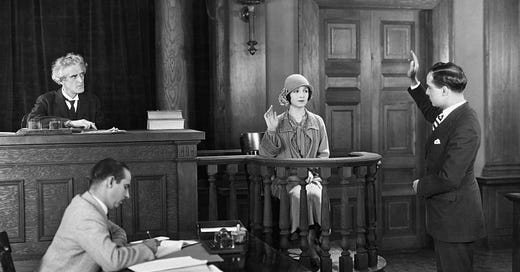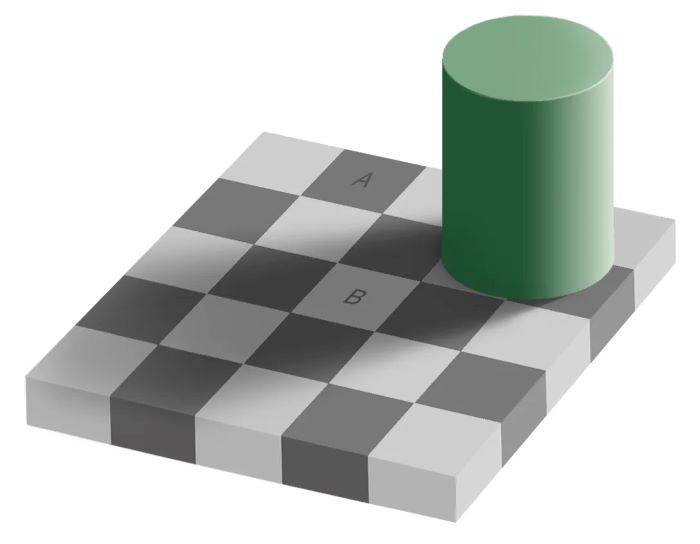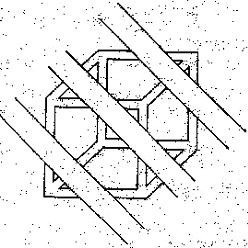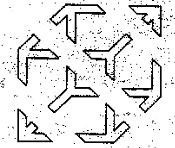This post looks at the impact of expectations and desires on our perception, and how our memories involve illusions.
The brain does not merely process the sensory information it receives. It constructs our perception of the world. With incomplete and ambiguous information, the brain automatically fills in gaps, conjuring images and sounds that may not exist.
This is a product of evolution, with survival hinging on swift reactions. To try to make sense of the environment the brain has evolved to rapidly piece together fragments of information, often resorting to quick and imperfect educated guesses.
Some of these automatic guesses, in the form of illusions, are so astounding that they appear unbelievable. A striking example is below, where blocks A and B surprisingly are the same tone of gray.
People perceive what they expect to perceive
Many illusions happen because we perceive what we expect or desire to perceive, but these expectations are wrong. Our perceptions are greatly influenced not ony by past experiences, but culture, language, emotions, and geography.
In the following four images, see how the second images defy your expectations.
Read the above picture. Then read the below with the ruler removed.
In the above, most perceive a cube behind the three diagonal bands. With the bands removed, we perceive something very different.
If you never saw the second images, you would have always believed your initial false perceptions were correct. You have many false perceptions that are never corrected.
We can be persuaded to perceive non-existent things
Images and sounds can be ambiguous and heard in different ways. If it’s noisy, you may mishear what someone says, and we often mishear rock lyrics.
With ambiguous noise, we can be coached to hear different, and wrong things.
The link below from an M.I.T. lab includes two great audio examples of how we can be coached to hear things, often different things, in speech and crowd chanting. When you expect or try to hear something, you often will hear it.
How do illusions trick the brain? - MIT McGovern Institute
This shows that what we hear, even what we are certain what is said, can be wrong. It also shows how two people can be sure they heard someone say two different things.
Our memories involve illusions
Our memories are not entirely reliable. The human brain not only manipulates and distorts current information but also retroactively modifies, embellishes, and falsifies perceptions of past events.
Elizabeth Loftus, a professor of psychology at the University of California Irvine, specializes in false memories, exploring how individuals can have fictitious recollections implanted in their minds and how memories themselves undergo alterations over time. She says memories should not be likened to objective photographic snapshots but to Wikipedia articles, subject to continuous addition, removal, and editing.
In an experiment, participants who had experienced traffic accidents were questioned about seeing "the broken headlight" at the accident scene, while another group was asked about "a broken headlight." Those questioned about "the broken headlight" were more likely to recall witnessing such an incident, although no broken headlight existed in any of the cases.
Eye witness testimony is convincing but often false
Eyewitness testimony is historically among the most convincing forms of evidence in criminal trials. However, eyewitness testimony often involves false or distorted memories.
The introduction of DNA testing prompted a reevaluation of numerous closed cases, as it showed the unreliability of eyewitness testimony. Among the cases where DNA testing showed the convictions were false, over seventy percent of the convictions were based on eyewitness misidentification. The average prison time served for these falsely convicted was fourteen years.
Philosophical questions
The realization that a significant portion of our perception of reality is illusory and that our memories can be false can be profoundly disconcerting. Visual and audio illusions pose intriguing challenges to our existence: How can we discern what is genuine?
This post does not advocate for outright skepticism toward everything our senses convey. Instead, it encourages us to work to identify our blind spots and misperceptions and know that our perceptions have unsolvable margins of error. Knowing the limits of our perceptions helps us come to more accurate knowledge and judgments. For example, knowing the limits of eyewitness testimony and memory would have helped many of the above-mentioned wrongly convicted defendants avoid prison.
References
Elizabeth Loftus: How Can Our Memories Be Manipulated? : NPR








